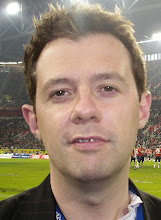“You have to sell tickets and sell sponsorships and have a good product on the court both as a game and for entertainment purposes. So that when people come they want to come back.” – The Gospel, according to David Stern.
Credit where credit is due. The NBA’s people – both in the UK and in New York - ensured that
Tuesday night’s exhibition game at London’s 02 Arena was an 18,000+ sell-out. I saw the league’s front office-personnel run themselves ragged before, during and after the contest to ensure it ran as smoothly as possible and that those with influence: corporate partners, media, VIPs and other glitterati, had the best experience possible.
If there’s one thing the Association knows how to do better even than basketball, it’s to put on a show. As I said, jokingly, to one senior NBA figure afterwards: “I always said you guys knew how to rig a game.” In truth, there could have been no better outcome to what – and let’s be honest here – was a meaningless pre-season outing, than a last-second score by James Johnston to separate Chicago and Utah. Other than perhaps if Luol Deng has been the one pulling the trigger in front of his hometown fans.
The evening, and the three days of intense promotional activity that preceded it, will have done much to push the NBA forward. More jersey sales, better ratings on ESPN this season, more moneymen eager to associate themselves with Stern’s enterprise.
“We find ourselves with a brand and we are managing it,” the Commissioner conceded beforehand. “It is sort of self-effectuating. Kids around the world are watching our games, and yesterday’s kids are today’s Tony Parker or Michael Pietrus, or Dirk Nowitzki, or Yao Ming. They watched the great players and they say I want to be like them and they take up the game.
“And as they take up the game, they want to buy our merchandise, watch our games on television, go online to find out what’s going on, and it turns out now that in many months we get more business to nba.com from outside the United States than from within.
“And, that leads us to attempt to monetise what is here. And from playing games, from sponsorships, from merchandise, from television and from online activities and other events and all of a sudden we couldn’t spell global brand but now we are one. And, that’s pretty good and we’re enjoying it.”
The NBA is about basketball, Stern declared. Above all, lest the hyperbole should suggest otherwise, it is a business.
What, however, does this entire endeavour mean for the sport in the UK as a whole? The buzzwords from the NBA regarding its relationship with the rest of British basketball’s myriad entities are co-operation and grassroots. As Stern told me, “historically, we have worked very carefully with the federations and the leagues, the ACB, the Bundesliga, and the BBL. We have been in consultations with them for probably 15 years.”
However, leaving The 02 late on Tuesday night after the arena had long since emptied, it wasn’t hard to name, and count, the opportunities squandered to maximise the benefits to the domestic game.
Passing by the NBA’s Jam Van beforehand, there were enthusiastic kids lining up to get a shot at the outdoor hoops. But what if they want another crack in three days time? Where were the details of numbers to call, or websites to access, to find out where their local team is located?
And what if, perish the thought, they wanted to drag their parents along to see another game this Saturday evening? No adverts, no flyers, for the BBL. How difficult would it have been to parade a single player from each team, in uniform, at half-time with the league’s website (or the present excuse for one), emblazoned on the electronic scoreboards? As one BBL General Manager, who attended the game, told me: ”we were only invited through sponsors.” Partnership, it seems, remains a work in progress.
Yet is the NBA culpable here? Yes, and no. “We hear a lot about what they might offer but beyond providing goody bags, there’s not much evidence,” the same GM said. Words have to be backed up with deeds, sure. But Stern is not running a charity.
How pro-active has the BBL been to take advantage of opportunities to help themselves? I questioned one other senior figure in the domestic league why, at Great Britain’s Game On tournament last month, there was no effort made to persuade those locals in attendance to sample the dubious joys of a London Capital game. The answer? ‘No time to organise it.’ If not then, or on Tuesday night, then when?
Stern’s advice is simple but sound. Everyone associated with our homegrown league should write down his mantra, pin it up in their offices, and repeat ad nauseum. The unbridled world-wide success of the NBA is testament to The Commissioner’s canniness.
Yet the UK has not yet been wholly conquered. One sell-out does not a conversion make. More people playing, more attending BBL games, more Bulls or Jazz vests sold. There is an inextricable link, as Stern underlined.
So, by the time the NBA circus rolls into town again next October, let us hope a means can be found to squeeze every potential benefit for all those with a stake. Otherwise, opportunities will again be lost for basketball, in the eyes of the uninitiated British public, to be more than just a glorious one-night wonder.

